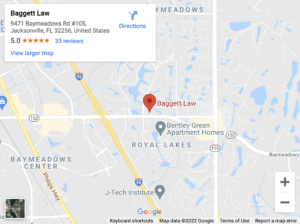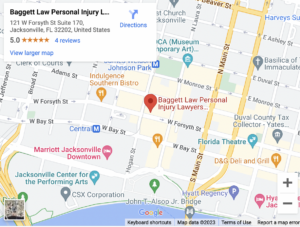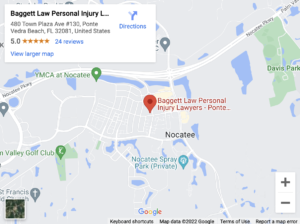
Before you can recover damages in a personal injury suit, you must prove the other party caused your injury. Therefore, you must prove the four elements of a negligence case. However, contributory fault could play a role in the value of your personal injury claim if you are partially to blame for the cause of your injury.
What is Contributory Fault?

All states have adopted a negligence standard for personal injury cases, including Florida. The standard is based on a common law tort rule. A tort is conduct that gives rise to harm or injury to another person, which can lead to a civil action for damages.
The laws determine how liability for damages is divided when multiple parties are responsible for causing personal injuries. The law specifically applies when the injured party bringing the action shares some blame for the cause of their injury.
Contributory fault laws are classified in one of three categories:
- Contributory negligence
- Comparative negligence
- Modified comparative negligence
Florida has adopted a modified comparative negligence fault standard for apportioning damages in a personal injury case. However, before discussing comparative negligence, it helps to understand more about contributory negligence.
What is Contributory Negligence?
Contributory negligence is a common law tort rule that bars an injured person from receiving any money for damages if the person is partially to blame for the cause of their injury. In other words, if you are 1% at fault for the cause of your car accident, you would be barred from recovery of any damages under a contributory negligence fault standard.
Only four states and the District of Columbia still use this fault standard. Those states are:
- Maryland
- Virginia
- Alabama
- North Carolina
All other states have adopted a pure comparative negligence standard or a modified version of comparative negligence.
What is Comparative Negligence?
Comparative negligence allocates damages based on the party’s percentage of fault for causing the accident. It is based on the reasoning that everyone has a duty of care to avoid conduct that can cause injury or harm to someone.
Therefore, if you are partially at fault for the cause of an accident, it would be unjust for you to receive full compensation for all damages caused by the accident. Instead, it is fair for you to receive compensation for damages based on your share of the damages.
Some states, including Florida, have adopted a modified comparative negligence standard. In these states, an accident victim is barred from recovery if their fault totals more than a specific amount. Depending upon the state, the bar is 50% or 51% fault. Florida has a 51% bar to recovery.
Therefore, if you live in a modified comparative negligence state and you are 52% at fault for the cause of your bicycle accident, you could not receive any money for your damages.
Florida’s Modified Comparative Fault Law
Florida Statute §768.81 is the code section explaining the state’s comparative negligence fault standard.
The law states specifically that a victim’s contributory fault in a negligence action does not bar recovery. However, if you have any blame for the cause of your injury, your damages decrease by the percentage of your fault. And if you have most of the blame, you cannot recover compensation.
For example, let’s assume a jury awards you $500,000 for a truck accident claim. The jury finds that you were 30% to blame for the cause of the truck crash because you were distracted when the collision occurred.
Therefore, the amount you receive for your personal injury case is $350,000. The amount equals the total award of $500,000 less 30% or $150,000.
If this percentage were 51% or more instead, you wouldn’t be able to recover any damages under Florida law.
Because Florida adopted a modified comparative negligence standard, you could be partially at fault for the cause of an accident yet still receive some compensation for your injury.
Tips for Protecting Yourself Against Comparative Fault Claims
Insurance companies understand Florida’s contributory fault law. They use the law to avoid paying full compensation to accident victims. However, there are steps you can take to protect yourself after an injury or accident:
- Report the injury or accident immediately
- Do not say you are sorry or discuss the accident in detail with anyone other than a police officer or your personal injury lawyer
- When answering questions for the police, give clear, concise responses. Do not offer information or answer questions they do not ask.
- Avoid talking to an insurance claims adjuster or other insurance representatives until you talk with a lawyer
- Seek immediate medical attention after an accident to document your injuries
- Avoid using social media or posting things online because posts, comments, and photos can be misconstrued
As soon as possible, contact a lawyer to discuss your case. Even if you are partially to blame, you could still be entitled to some compensation for your economic and non-economic damages from the accident.
Schedule a Free Consultation with a Personal Injury Lawyer
Call a law firm to schedule a free case review with a personal injury attorney if you need assistance with your personal injury claim. They can help guide you through the process and can help you determine whether contributory fault will play a role in the proceedings.




